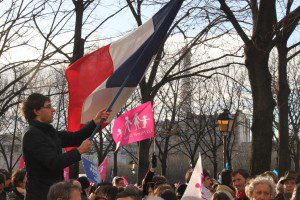A Guest Post by Michael Bosia, Associate Professor of Political Science, Saint Michael’s College
In a startling juxtaposition, neofascists killed young leftist activist Clément Méric in the first days when city halls across France opened for lesbian and gay couples to marry. And perhaps the debate on marriage weakened President François Hollande despite his victory. That is because no one anticipated the revival of a moral intransigence and violence reminiscent of the rightist movements of the 1930s, as the debate intensified divisions within the Gaullist-led coalition essential to the 5th Republic and unsettled laïcité at the core of the Republican consensus.
French laïcité – the principle that religion has no role in government – is rooted in the struggle against legitimists and the Church waged since the Revolution: from the suppression of the Chouannerie uprising, through laws on secular education and the separation of church and state under the Third Republic, to the bloody clashes between legitimists and leftists on the streets of Paris in 1934. Only after Vichy and the Resistance transformed politics, and the Algerian war provided pretext, would Charles De Gaulle find France ready for a broad republican movement moderating secular left and national right alike.
With religion depoliticized, De Gaulle’s successors turned so far from conservative Catholics that they legalized abortion in the 1970s. But as laïcité moved from ideology to accepted wisdom, left and right supported state funding of religious schools. Laïcité was central to the politics of national identity and immigration, justifying the 2004 law banning headscarves from public schools and the Gaullist-led UMP government’s bulldozing of religious objections to include yarmulkes and large crosses in the ban. Even religious leaders appealed to laïcité, opposing a 2011 conference called by the UMP to evaluate an imagined threat to the Republic posed by Islam. So the Socialist promise of a marriage law in the 2012 election might not have challenged the UMP. After the debate over civil union in 1999 confounded Gaullists as they marched alongside Front National militants with banners reading, “Fags, to the bonfires,” the UMP cultivated an LGBT contingent under Nicolas Sarkozy. Especially with conservative governments in Spain and Portugal acquiescing to their new marriage laws, France looked lagging. Some in the UMP began to speak privately of their support.
But the UMP is a fragmented coalition, dominated by Gaullists but including liberals and Christian democrats, and some saw an opportunity when “Manif Pour Tous” began organizing against the law last summer. Manif regroups faith-based networks providing financial and technical support, reported Mediapart.com, Yagg.com, and Le Monde, with the pro-life movement sending over a key tactician, and parish leadership mobilizing for the series of rallies around France since December. But the public face of Manif Pour Tous has included both a gay UMP activist and a sometime chanteuse and Gaullist partisan, Frigide Barjot, who once said, “There are no French values without Christian foundations.” UMP leader Jean-François Copé marched in their ranks, and a symbiosis developed, with UMP deputies adopting the demonstrators’ more unfounded objections while militants lodged partisan attacks against Hollande – like a French Tea Party. Inside, UMP opponents raised the specter of surrogacy and medically assisted procreation, neither of which were included in the proposal. Outside, Manif charged Hollande with ignoring unemployment while dismantling the family, branding him a dictator as he racked up legislative victory after victory, finally demanding his resignation.
Though not unusual in the US, it is for De Gaulle’s successors to openly embrace a large faith-based movement for partisan advantage. It has been 30 years since Jacques Chirac, then Gaullist leader, danced with the Church over the Socialist government’s proposals on funding religious schools. But it is also striking that Copé exploits this alliance for factional advantage as he contests control of the UMP with former premier François Fillon, whom he defeated in a close UMP leadership election last year. Fillon did not equivocate before the law’s adoption, but early on he was troubled by a “brewing unhealthy violence” he blamed on both Copé’s allies and Hollande. Marriage even figured in the primary for mayor of Paris, with Manif working to defeat a UMP deputy who abstained from voting on the law. Copé joined Manif in demanding a referendum; Fillon from the start opposed such a vote as divisive.
As the UMP encouraged popular mobilization, space opened for an intransigently moral and sometimes violent nationalist fringe like the anti-republican movements of the 1930s. At some demonstrations, ultranationalists provoked violent confrontation with police, and then attacked reporters. One opponent of the law shot himself in the head before the alter in Notre Dame. Two groups frequently demonstrate with their faces covered: Printemps Français plastered a conference hall with slogans against marriage rights – “we let nothing go” – the night before LGBT associations were to meet inside; the topless men of Hommen who disrupted the French Open are a testosterone driven reaction to the feminist group Femen. Throughout the spring, anti-gay violence was on the rise across France, frequently with serious injury and hospitalization. Sometimes, the attacks followed demonstrations over the marriage law: in Lille, after a Manif rally, employees at a gay bar were assaulted, the bar sacked by five men known for their extremist associations shouting “shut up, dirty fags.” Brutal attacks have occurred against couples in Paris and across France. SOS-Homophobie reported that violence increased rapidly as the marriage debate unfolded – at the fastest rate in eight years of monitoring.
There is certainly no suggestion of coordination with the fringe, as the UMP and Manif are instead divided and outflanked. Some in the UMP have attacked the police and not the neofascists who provoke them, and Barjot said the law was responsible for violence. But she also was shouted off stage for endorsing civil unions. As the leadership battle continues, the factionalization of the UMP and fragmentation of Manif foster the intransigent right, awakening an historic cleavage over national morality and a virulently anti-left and confrontational extremism. The questions now are how the right will reconfigure, and what will become of the Gaullist consensus so strongly attached to Republican laicité ?
Laura Sjoberg is British Academy Global Professor of Politics and International Relations at Royal Holloway University of London and Professor of Political Science at the University of Florida. Her research addresses issues of gender and security, with foci on politically violent women, feminist war theorizing, sexuality in global politics, and political methodology. She teaches, consults, and lectures on gender in global politics, and on international security. Her work has been published in more than 50 books and journals in political science, law, gender studies, international relations, and geography.



A very interesting analysis, I think, esp. for those of us who have not been following this closely. I have read it quickly and plan to read it again at more leisure.
UPDATE: Inspired by extreme right men’s group, Hommen, who disrupted the French Open, a UMP member is organizing protests at the Tour de France.